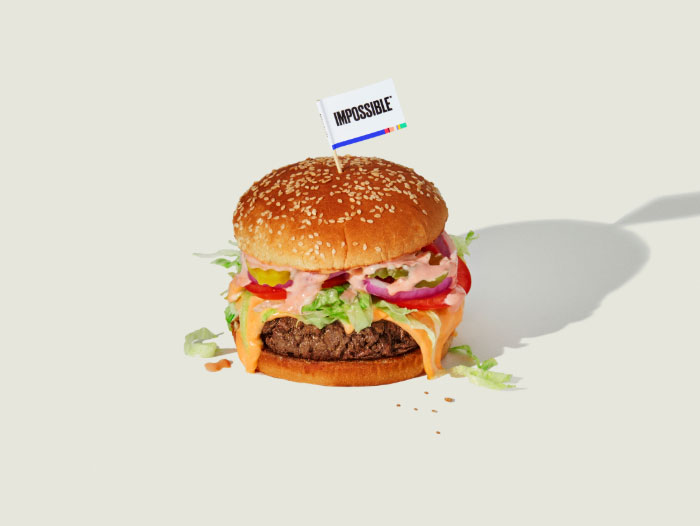Impossible Foods Releases 2019 Impact Report, Asking, “If Not Us, Then Who?”
June 14, 2019 | 4 min to read

REDWOOD CITY, Calif.- Impossible Foods, maker of the famously delicious Impossible™ Burger, today published its 2019 Impact Report. The annual report tells the story of the year’s progress in creating market-based environmental impact, in achieving sustainability milestones through innovation in operations, and advancing the urgent agenda of dietary transformations. Impossible’s ultimate mission is to replace the need for animals as a global food-production technology by 2035. This report is an urgent call to action for its readers, highlighting the cultural and research-driven awakening that is finally linking climate, biodiversity and food.
Impossible Foods kicked off 2019 with a product upgrade that truly delivered on the promise of replacing ground beef, and did so at a massive scale in some of the best known fast-food restaurants in America; from Burger King and White Castle to Qdoba and Red Robin. The new Impossible™ 2.0 recipe improved the sustainability and nutritional credentials of the product while sparking soaring taste-driven demand. The report cites internal research to show how Impossible’s sales are translating into impact — empowering our meat-eating consumer base, 95% of whom are omnivores, towards climate action and land sparing.
This confluence of scale and demand means Impossible Foods is empowering more and more consumers to protect Planet Earth through their purchasing decisions. If everyone who ate an Impossible Burger in 2018 chose it explicitly over a burger made from cows, we would have collectively spared greenhouse gas emissions equivalent to 250 million driving miles in a typical US car, a land area nearly the size of San Francisco and enough water to hydrate 3 million people for a year.
“The use of animals to produce food for human consumption has long been taken for granted as an indispensable part of the global food system,” said Impossible Foods’ CEO, Chairman and Founder Dr. Patrick O. Brown. “Yet global demand for the foods that have, until now, been produced using animals continues to surge — and their catastrophic impact on climate, water resources, biodiversity and ecosystem integrity keeps skyrocketing. Awareness isn’t enough; we need urgent action.”
It Begins with Us
Iterating for success at Impossible Foods also involves introspection and self-measurement. The company’s Impact Report notes its internal commitments to employees, our consumers, our community and the health of our planet.
With the launch of Impossible Burger 2.0 in January 2019, Impossible Foods worked with independent sustainability consulting firm, Quantis, to carry out an updated life cycle assessment (LCA). The report details the rigorous comparison of the environmental impact of the Impossible Burger to that of a conventional beef burger. It also charts ongoing strategies for even more footprint reductions, including innovations for water saving technology in heme production and burger manufacturing.
Finally, the report offers a first look at soon-to-be-published research on the game-changing carbon capture potential that would be enabled by replacing livestock with plant-based meat production, and allowing native ecosystems that have been usurped by feed crops and livestock grazing to recover their original biomass and biodiversity. The findings help quantify the ways that plant-based diets can literally turn back the clock on climate change. The landscapes most valuable for keeping carbon out of the atmosphere are also at the highest risk of destruction to expand meat production for markets across the world, which is why it’s so important that the Impossible Burger is now available in more than 9,000 restaurants in every state in America — as well as Hong Kong, Singapore and Macau.
ABOUT IMPOSSIBLE FOODS
Based in California’s Silicon Valley, Impossible Foods makes delicious, nutritious meat and dairy products from plants — with a much smaller environmental footprint than meat from animals. The privately held company was founded in 2011 by Patrick O. Brown, M.D., Ph.D., Professor Emeritus of Biochemistry at Stanford University and a former Howard Hughes Medical Institute investigator. Investors include Khosla Ventures, Bill Gates, Google Ventures, Horizons Ventures, UBS, Viking Global Investors, Temasek, Sailing Capital, and Open Philanthropy Project (Jay-Z, Selena Williams, Katy Perry, etc.)
